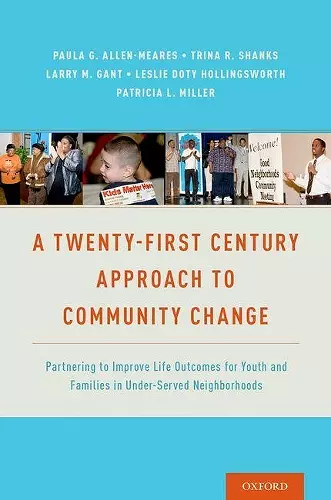A Twenty-First Century Approach to Community Change
Partnering to Improve Life Outcomes for Youth and Families in Under-Served Neighborhoods
Larry M Gant author Leslie Hollingsworth author Patricia L Miller author Paula Allen-Meares editor Trina R Shanks editor
Format:Hardback
Publisher:Oxford University Press Inc
Published:14th Sep '17
Currently unavailable, and unfortunately no date known when it will be back

Urban renewal has been the dominant approach to revitalizing industrialized communities that fall into decline. A national, community-based organization, the Skillman Foundation sought to engage in a joint effort with the University of Michigan's School of Social Work to bring six neighborhoods in one such declining urban center, Detroit, back to positions of strength and national leadership. A Twenty-First Century Approach to Community Change introduces readers to the basis for the Foundation's solicitation of social work expertise and the social context within which the work of technical assistance began. Building on research, the authors introduce the theory and practice knowledge of earlier scholars, including the conduct of needs assessments at multiple levels, engagement of community members in identifying problem-solving strategies, assistance in developing community goals, and implementation of social work field instruction opportunities. Lessons learned and challenges are described as they played out in the process of creating partnerships for the Foundation with community leaders, engaging and maintaining youth involvement, managing roles and relationships with multiple partners recruited by the Foundation for their specialized expertise, and ultimately conducting the work of technical assistance within a context of increasing influence of the city's surrounding systems (political, economic, educational, and social). Readers will especially note the role of technical assistance in an evolving theory of change.
Fortunately, the veterans of a long-term, comprehensive community initiative to improve outcomes for children and families in Detroit are skilled researchers, writers, and teachers, for the account they have created has added great value for students in social work, and all committed to fostering effective place-based strategies. The University of Michigan's partnership with the Skillman Foundation and the participants in the Good Neighborhoods Initiative in six Detroit communities has yielded a remarkable collection of insights and practical tools for advancing systematic, resident-driven change. . . . The strengthened grass-roots organizations and the residents' greater capacities to advocate for policy change will serve their communities well, and the lessons drawn from these experiences can guide the fields of social work and community organizing for years to come." * Angela Glover Blackwell, President and CEO, PolicyLink *
Although it's well known that children's success requires multi-faceted investments over a prolonged period of time, few foundations have the vision and patience to make the sustained investment that the Skillman Foundation has made in children in six low-income neighborhoods in Detroit. Fewer still commit to documenting, evaluating and learning from their work. Skillman has established a partnership with the UM School of Social Work and Detroit's neighborhoods that has led to high quality implementation as well as deep learning. This book makes an enormous contribution to our understanding of how to put into place an ambitious initiative to improve life outcomes for children growing up in our nation's poorest communities. The book is especially rich because it is more than an academic analysis: as the authors tell the story, they capture the perspectives of all of the stakeholders from the community to statewide actors." * Anne C. Kubisch, President, The Ford Family Foundation *
This rich case study tells the story of a powerful community rebuilding initiative in Detroit, a city that has come to embody the problems caused by neoliberal globalization, disinvestment, and racism in American cities. It offers detailed insights into a collaborative project that models the best in community development practice - merging grassroots participatory leadership, local assets, and community empowerment with a strategic framework, technical assistance, and evaluative capacities." * Loretta Pyles, PhD, Associate Professor, School of Social Welfare, State University of New York at Albany; author of Progressive Community Organizing: Reflective Practice in a Globalizing World *
[The book] is an extraordinary work that breaks new ground in how academics and their foundation partners need to approach urban community development projects if lasting change is to occur. What makes this work stand out is an unstated yet consistently woven theme . . . the theories of change you emphasize must also include yourselves as open to transformation as well as the targeted communities . . . As the reader will find, systematic inquiry, data collection, historical understanding, and technical assistance matter, too - as long as they remain framed within this belief that working with the community changes us as much as them. Given the political and economic contours of the twenty-first century landscape so far, such lessons perhaps have never been more timely and important." * Steve Burghardt, MSW, PhD, Professor of Social Work, Silberman School of Social Work at Hunter College-CUNY; author of Macro Practice in Social Work for the 21st Century *
ISBN: 9780190463311
Dimensions: 239mm x 157mm x 23mm
Weight: 612g
320 pages